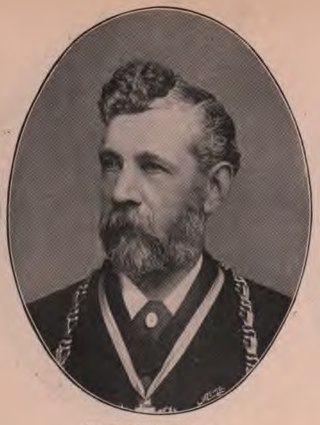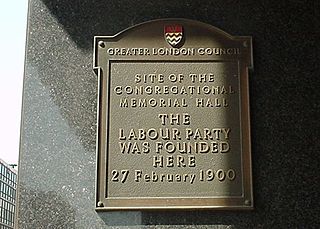Related Research Articles

James Keir Hardie was a Scottish trade unionist and politician. He was a founder of the Labour Party, and served as its first parliamentary leader from 1906 to 1908.

The Scottish Labour Party (SLP), also known as the Scottish Parliamentary Labour Party, was formed by Robert Bontine Cunninghame Graham, the first socialist MP in the Parliament of the United Kingdom, who later went on to become the first president of the Scottish National Party, and Keir Hardie, who later became the first leader of the Independent Labour Party and the Labour Party.

Stephen Owen Davies was a Welsh miner, trade union official and Labour Party politician, the Member of Parliament (MP) for Merthyr Tydfil, previously Merthyr for nearly 38 years, from 1934 to 1972. In 1970, well past 80, he was deselected as parliamentary candidate by his local party association because of his age. He fought the election in the 1970 general election as an independent candidate and won comfortably, a rare example in British politics of an independent candidate defeating a major party's organisation. In a BBC TV interview the day after that election, he claimed to be 83 years old.
Aberdare was a constituency in the Parliament of the United Kingdom. It was created for the 1918 general election and returned one Member of Parliament (MP) by the first past the post system until it was abolished for the 1983 general election. The Labour Party gained the seat in 1922 and held it comfortably until its abolition.
Merthyr Tydfil was a parliamentary constituency centred on the town of Merthyr Tydfil in Glamorgan. From 1832 to 1868 it returned one Member of Parliament (MP) to the House of Commons of the Parliament of the United Kingdom, and in 1868 this was increased to two members. The two-member constituency was abolished for the 1918 general election.
Finsbury East was a parliamentary constituency centred on the Finsbury district of North London, England. It returned one Member of Parliament (MP) to the House of Commons of the Parliament of the United Kingdom, elected by the first past the post system.

Charles Butt Stanton was a British politician, who served as an Member of Parliament (MP) from 1915 to 1922. He entered Parliament by winning one of the two seats for Merthyr Tydfil at a by-election on 25 November 1915 caused by the death of Labour Party founder, Keir Hardie. After the two-member Merthyr Tydfil seat was divided into two single member seats, Stanton focused on the Aberdare division, which he won at the 1918 general election, but lost at the 1922 general election.

The 1934 Merthyr by-election was a parliamentary by-election held on 5 June 1934 for the British House of Commons constituency of Merthyr in Wales.
The 1889 Govan by-election was a parliamentary by-election held on 18 January 1889 for the British House of Commons, constituency of Govan in Lanarkshire, Scotland.
The 1902 Cleveland by-election was a parliamentary by-election held for the House of Commons constituency of Cleveland in the North Riding of Yorkshire on 5 November 1902.
The 1915 Merthyr Tydfil by-election was a parliamentary by-election held on 25 November 1915 for the British House of Commons constituency of Merthyr Tydfil in Glamorganshire, Wales.

A by-election was held for the British House of Commons constituency of Sheffield Attercliffe on 5 July 1894. It was the first parliamentary election contested by the Independent Labour Party.
The Glasgow Tradeston by-election was a Parliamentary by-election held on 6 July 1911. It returned one Member of Parliament (MP) to the House of Commons of the Parliament of the United Kingdom, elected by the first past the post voting system.
The South Lanarkshire by-election was a Parliamentary by-election held on 12 December 1913. The constituency returned one Member of Parliament (MP) to the House of Commons of the United Kingdom, elected by the first past the post voting system.
The Colne Valley by-election was a Parliamentary by-election held on 18 July 1907. The constituency returned one Member of Parliament (MP) to the House of Commons of the United Kingdom, elected by the first past the post voting system.
The 1917 Edinburgh South by-election was a parliamentary by-election held for the House of Commons constituency of Edinburgh South in Scotland on 12 May 1917.

The Labour Representation Committee (LRC) was a pressure group founded in 1900 as an alliance of socialist organisations and trade unions, aimed at increasing representation for labour interests in the Parliament of the United Kingdom. The Labour Party traces its origin to the LRC's foundation.
The October 1888 Merthyr Tydfil by-election was a parliamentary by-election held for the House of Commons constituency of Merthyr Tydfil in Wales on 26 October 1888.
References
- British Parliamentary Election Results 1885-1918, compiled and edited by F.W.S. Craig (Macmillan Press 1974)
- ↑ Punch, in its edition of 28 April 1888 referred to the moving of the Writ on Monday 16 April.
"Writ moved today for election for Mid-Lanarkshire. So exit STEPHEN MASON. Pity he wasn't here just another night to take part in revolt against Lord Advocate ...".
- ↑ Who's Who of British Members of Parliament, Volume II 1886-1918, edited by M. Stenton and S. Lees (Harvester Press 1978)
- ↑ (1) Craig. (2) Who Was Who, Vol. III 1929-1940 (Adam and Charles Black 1947).
- ↑ (1) Craig. (2) Who Was Who, Vol. IV 1941-1950 (Adam and Charles Black, 3rd edition 1964).
- ↑ (1) Craig. (2) Dictionary of Labour Biography, edited by Greg Rosen (Politico's Publishing 2001).
- ↑ Craig
- ↑ The Constitutional Year Book, 1904, published by Conservative Central Office, page 182 (206 in web page)
- ↑ (1) Craig. (2) Debrett's House of Commons and Judicial Bench, 1889